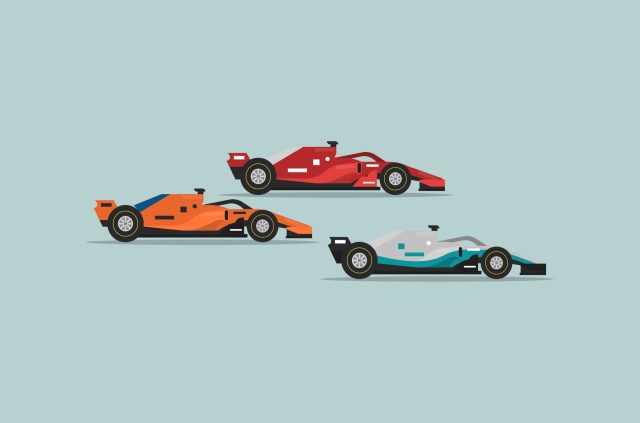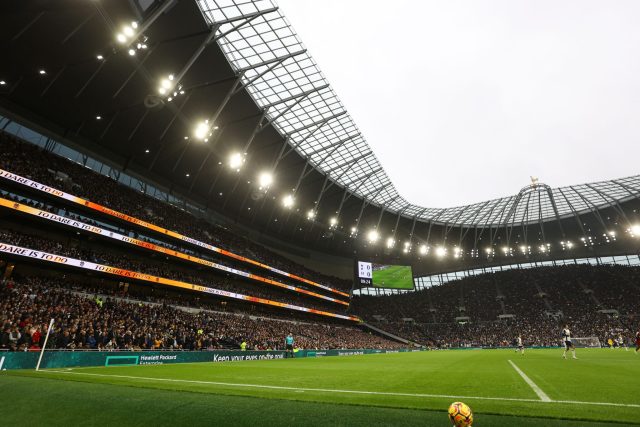Formula 1 is home to some of the fastest and most technologically advanced cars on the planet. For over 70 years, teams have built engineering marvels driven by talented drivers in their never-ending quest to be the first to reach the finish line.
Among the hundreds of F1 cars that raced on the world's most prestigious circuits in history, a handful hold the distinction of being the best in terms of sheer speed and raw power. We’ve identified those that push boundaries with their average speed or top speed, or against other series like NASCAR and IndyCar.
The top 10 fastest F1 cars of all time
When ranking the fastest Formula 1 cars in history, it's not just about raw speed on the straights; it's also about overall performance, including handling, reliability, and race dominance. Each car on this list represents a combination of engineering innovation, driver skill, and strategic excellence. We've considered top speeds, race victories, and the groundbreaking technologies that make these the fastest F1 cars ever built.
10. Lotus 78 (1978): the pioneer of “ground effect” dominance
The Lotus 78, known for its iconic black and gold John Player Special paint, was a game-changer in Formula 1. Mario Andretti drove it to win the 1978 World Championship, thanks to its groundbreaking use of ground effect aerodynamics, which greatly improved downforce and handling. This innovative design made the car faster, leading to five victories in the 1978 season and setting a new benchmark for speed and performance in F1.
9. Williams FW14B (1992): innovation ahead of its time
The Williams FW14B, a groundbreaking car, dominated the 1992 F1 season, earning Williams a record nine wins. Adrian Newey designed the FW14B to be incredibly lightweight, with a carbon fiber chassis and advanced technology like active suspension and traction control. Nigel Mansell and Riccardo Patrese, the car's primary drivers, harnessed its superior speed and handling to win races by significant margins. By the end of the 1992 season, Mansell won the Drivers' Championship, Patrese finished second, and Williams secured the Constructors' title.
8. Brawn BGP 001 (2009): the underdog that defied the odds
The 2009 F1 season was like a fairytale for Brawn GP. Honda was building the car, but quit right before the season started. Ross Brawn bought the team, finished building the BGP 001 using mismatched parts and an engine from Mercedes, and dealt with several other issues. Despite this, Brawn’s BGP 001 proved incredibly fast, outpacing Ferrari in qualifying runs, largely due to the car's controversial "double diffuser wing," which gave it a significant downforce advantage. With Jenson Button and Rubens Barrichello driving, Brawn GP dominated the season, winning both the Drivers' and Constructors' Championships.
7. Williams BMW FW26 (2004): the legendary “walrus nose”
In terms of raw speed, the BMW FW26 was the faster car in 2004, even though it couldn’t win as many races as the Ferrari F2004. Juan Pablo Montoya set the unofficial lap record during qualifiers, reaching 162.950 mph. The BMW’s distinctive "walrus nose" design, aimed at maximizing airflow, showed promise in testing but struggled to maintain its high speed and performance throughout an entire race.
6. Ferrari F2004 (2004): Schumacher's unstoppable force
Michael Schumacher drove the Ferrari F2004 to a record-breaking seventh World Championship. Under Ross Brawn's technical leadership, Ferrari perfected this machine, winning 15 of 18 races in 2004 and making it one of the most dominant cars in F1 history. The F2004 set lap records at Monza, Magny-Cours, and Shanghai, showcasing its speed and reliability with a top speed of 200 mph, and secured both the Drivers' and Constructors' Championships.
5. McLaren MP4-4 (1988): a season of dominance
The 1988 F1 season was unforgettable, with Alain Prost and Ayrton Senna driving the McLaren MP4-4 to near-total victory. The car was powered by a 1.5-liter, 650-horsepower Honda V6 engine—technically not as powerful as other F1 cars on the circuit, but incredibly efficient. The lightweight, streamlined design made up for the lack of power, helping Senna secure 13 pole positions and both drivers to win 15 out of 16 races. This dominance led Senna to win the 1988 Drivers' Championship, Prost to finish second, and McLaren to clinch the Constructors' title, marking one of the most dominant seasons in F1 history.
4. Red Bull RB7 (2011): Red Bull's masterpiece
The Red Bull RB7 is one of the most successful F1 cars ever. Sebastian Vettel secured 18 out of 19 pole positions, 12 wins, and never finished lower than 5th place while driving the RB7 in 2011. It was a key factor in his four consecutive World Championships from 2010 to 2013. Powered by a 2.4-liter naturally aspirated Renault V8 engine and featuring an exhaust-blown diffuser, the RB7 was unmatched on the track, despite the controversy surrounding its innovative aerodynamics.
3. Ferrari SF70H (2017): a triumphant return to form
Ferrari made a strong push to challenge Mercedes and Red Bull with the SF70H, a car that celebrated Scuderia Ferrari's 70th anniversary in style. Driven by world champions Kimi Räikkönen and Sebastian Vettel, the SF70H featured a powerful 1600-cc V6 engine that delivered up to 1,000 horsepower, combined with a lightweight carbon fiber chassis and advanced semi-automatic transmission. The car's impressive performance earned Ferrari 20 podiums in 20 races, with Vettel finishing second in the Drivers' Championship and securing a memorable win at the Monaco Grand Prix.
2. Red Bull RB18 (2022): advanced aerodynamic design
After nearly a decade in Mercedes' shadow, Red Bull returned to dominance with the RB18. Adrian Newey took advantage of F1's updated aerodynamic regulations and added a ground effect design that provided exceptional downforce. This significantly improved stability and made the car quick through corners. Powered by a reliable Honda engine, the RB18 led Max Verstappen to 16 wins and Sergio Perez to two, securing the Constructors' Championship for Red Bull and earning Verstappen his second World Championship.
1. Mercedes W11 (2020): the pinnacle of performance
The Mercedes W11 is widely regarded as the fastest F1 car of all time. Entering the 2020 season under immense pressure to continue dominating the circuit, Mercedes delivered a machine worthy of Lewis Hamilton and Valtteri Bottas. With a finely tuned chassis, advanced transmission, and a Mercedes V6 power unit producing 1,025 horsepower, the W11 not only held off Red Bull but also set multiple lap records. Its exceptional performance, combined with Hamilton's unmatched talent, secured both the Drivers' and Constructors' Championships, making the W11 a benchmark in F1 history.
What is the fastest F1 car in 2024?
&pp=ygUVbWVyY2VkZXMgcmVkYnVsbCAyMDI0
The Red Bull RB20 was considered the fastest car during the 2024 preseason testing. Several teams have made significant progress, though, resulting in a performance that’s on par or better than the RB20. Mercedes has rediscovered its winning form and won thrice before the summer break, while Ferrari and McLaren currently have two wins apiece.
Who is the greatest F1 driver of all time?
&pp=ygUWbGV3aXMgaGFtaWx0b24gdmljdG9yeQ%3D%3D
Several names often crop up in the endless debate on who's the greatest F1 driver of all time. These include Lewis Hamilton and Michael Schumacher who have seven championships apiece. Hamilton has an edge as an active driver, though, with 105 wins (and counting!). Juan Manuel Fangio is also considered among the greats whose five championships remained unbeaten for decades.
Others on the list are Alain Prost and Sebastian Vettel who both have four championships, as well as Ayrton Senna and Max Verstappen with three. Verstappen, who currently leads the driver's championship, may capture his fourth title this year if he maintains his position amid ever-growing competition.
Why you need a VPN to watch Formula 1
No matter where you are, ExpressVPN lets you stream every race of the 2024 F1 season. Stuck at work on a Sunday? Just connect to a VPN server to stream from anywhere, even on restricted networks. You can unblock streaming sites at the office and watch the races privately.
ExpressVPN encrypts all your traffic so you can stream securely, without having to worry about any third parties snooping on your activity. This is especially important if you stream on public Wi-Fi networks, which can be risky. Since no one can see what you’re doing online, including your ISP, you can also bypass activity-based throttling and live stream F1 races with no lag or buffering.
ExpressVPN is easy to set up and use on any major streaming device, even if you’ve never used a VPN before. If you have any questions about streaming Formula 1 with ExpressVPN, our 24/7 customer support team is always available to help.
Formula 1 is more popular than ever—don’t miss out
With increased competition and more intense wheel-to-wheel battles, the 2024 F1 season is shaping out to be one of the most exciting yet. ExpressVPN’s blazing-fast VPN servers give you a smooth and buffer-free streaming experience, so you don’t miss out on the action on track. You can try ExpressVPN risk-free with our 30-day money-back guarantee!
FAQ: What is the Fastest F1 Car of All Time?
What is the fastest F1 car of all time?
Is the Mercedes W11 the fastest F1 car ever?
What is the fastest an F1 car has gone?
What is the fastest accelerating F1 car?
What is the fastest Ferrari F1 car?
Which F1 car is fastest on the straight?
Which is faster: INDYCAR or F1?
Is NASCAR faster than F1?
Which road car is faster than an F1 car?
Take the first step to protect yourself online. Try ExpressVPN risk-free.
Get ExpressVPN

















